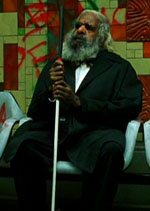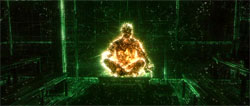Seraph
 Seraph is the singular of Seraphim, a Hebrew word that means the burning ones. In the New Testament of the Holy Bible, Seraphim are the highest order of angels, directly attending/guarding the throne of God. It is no coincidence that Seraph protects the Oracle, and that he is the most powerful fighting program in the Matrix, able to even stand his ground against Neo, the One himself.
Seraph is the singular of Seraphim, a Hebrew word that means the burning ones. In the New Testament of the Holy Bible, Seraphim are the highest order of angels, directly attending/guarding the throne of God. It is no coincidence that Seraph protects the Oracle, and that he is the most powerful fighting program in the Matrix, able to even stand his ground against Neo, the One himself.
In the Bible, Seraphim have six wings: two to cover their face, two to cover their feet, and two to fly. Seraphim can also have many appearances. In M3, Smith tells Seraph, "I remember chasing you was like chasing a ghost." This suggests that Seraph could disappear by disguising himself as other people.
Stated in his own words, Seraph's purpose is to "protect that which matters most." The Oracle would "matter most" not only because of her power to see the future and the hope she brings for evolution of machines, but especially because she is the Prime Program of the Matrix (as I support in Matrix System: Prime Program). Before the Oracle was part of the Matrix, the Merovingian would have "mattered most" since he was the Prime Program, and he protected Mobil Avenue, the entrance for the Source (see Merovingian).
In the Bible, Seraphim are awesome, frightening creatures that do not even resemble humans. This gives us more insight into the Trainman's reaction to Seraph, a reaction of sheer fright:
Trainman: Get away! Get away from me!
Seraph: We don't want trouble.
Trainman: Get the hell away from me! |
How many times do we see conversations like the above when angels talk to people in the Bible? People are always so terrified to see angels that the angels must always specifically tell them not to be frightened. We also get a similar reaction from the coat check girl when the elevator door opens and she sees Seraph: "Can I take your... oh my God."
It is speculated in The Matrix Online that Seraph used to be a Seraphim Agent from an earlier Matrix version, presumably set in Biblical times. This would help to explain why Seraph is an exile (as Smith said in M3, "the last exile," implying that Smith had already infected all other exiles).
Seraph in M1
 Remember in M1, when Morpheus goes to see the Oracle, Morpheus did not have to fight Seraph. In fact, we don't even see Seraph protecting the Oracle. Or do we? Morpheus and a blind man exchange nods as Morpheus walks by him in the hallway. I think that man was Seraph, giving permission to Morpheus to pass by and enter the door to the Oracle (in this case, an elevator). Morpheus had seen the Oracle before, so fighting Seraph was not necessary this time. The blind man also wears very similar sunglasses to what Seraph wears.
Remember in M1, when Morpheus goes to see the Oracle, Morpheus did not have to fight Seraph. In fact, we don't even see Seraph protecting the Oracle. Or do we? Morpheus and a blind man exchange nods as Morpheus walks by him in the hallway. I think that man was Seraph, giving permission to Morpheus to pass by and enter the door to the Oracle (in this case, an elevator). Morpheus had seen the Oracle before, so fighting Seraph was not necessary this time. The blind man also wears very similar sunglasses to what Seraph wears.
Guardian angels are often invisible, but they are always there protecting whoever needs protection. That's what Seraph was doing in M1, and it's why Seraph arrived so fast in Enter the Matrix. (The Oracle says, "Thank you for coming so quickly.")
Fighter Prints
Seraph says (after fighting Neo), "You do not truly know someone until you fight them." This goes along with his statement in Enter the Matrix, "Appearances can be deceiving... and it falls upon me to measure a heart's resolve." To Seraph, a program who himself changes appearances, the way someone fights is like a fingerprint that reveals beyond appearances.
Gold Code
In M2, Neo sees the gold code of Seraph:
I think that Machines appear gold, while programs appear green. Seraph is essentially the firewall for machine civilization. Every computer technician knows that hardware firewalls are infinitely more difficult to penetrate than software firewalls. Therefore Seraph would serve his purpose best when he can act independently of the Matrix. It would make perfect sense for the protector of what matters most to be a real machine in Machine City jacking into the Matrix as a hardware device protecting the system, rather than a piece of software like Windows Defender, getting slapped around within the Matrix by hacks that can easily find a way around it.
Regarding the picture above, one forum user named wAkE_uP_nEo pointed out an interesting symbolic parallel:
We all know the Wachowskis' fascination with Buddhism...
When the Buddha achieves enlightenment, his soul was supposed to glow gold from within. Notice in the scene where Seraph's gold code is revealed, he is sitting in the typical Buddha pose. If you saw that shot completely out of context of the movies, you would be forgiven for thinking it was supposed to be Buddha. So, perhaps it is something to do with enlightenment. |
Who's the Badass: Neo or Seraph?
When Neo and Seraph fight, Neo is only able to hit Seraph solidly one time in the whole fight. Is Seraph a better fighter than Neo? We don't really know based on the fight alone. We don't know if Seraph is trying as hard as he can to hit Neo, or if he's only throwing kicks and punches that he knows only the One would be able to block. Same with Neo: he might be a bit reluctant to put forth 100% effort when he isn't really sure if Seraph is a "bad guy," (i.e. Seraph apologized in advance for fighting Neo).
But we do know that when Neo fights Smith at the end of M3, Smith is the assimilation of every program and exile in the entire Matrix (we could call him Everything-Smith), and until Neo finally decided to give up, Everything-Smith still couldn't beat Neo. So, it would appear that Neo is a better fighter than Seraph and that Neo was indeed holding back when he first met Seraph. And, if Seraph was indeed an agent of a previous Matrix version, we already know that the One is granted powers by the system that can overwhelm any agent, current or former. Previous Ones were able to do to Seraphim what Neo can do to the current FBI-like agents, and Neo seems to be smarter and faster than previous Ones.
| 
Merovingian: Persephone |
| 
Seraph: Changed Loyalties |
|
 Seraph is the singular of Seraphim, a Hebrew word that means the burning ones. In the New Testament of the Holy Bible, Seraphim are the highest order of angels, directly attending/guarding the throne of God. It is no coincidence that Seraph protects the Oracle, and that he is the most powerful fighting program in the Matrix, able to even stand his ground against Neo, the One himself.
Seraph is the singular of Seraphim, a Hebrew word that means the burning ones. In the New Testament of the Holy Bible, Seraphim are the highest order of angels, directly attending/guarding the throne of God. It is no coincidence that Seraph protects the Oracle, and that he is the most powerful fighting program in the Matrix, able to even stand his ground against Neo, the One himself. Remember in M1, when Morpheus goes to see the Oracle, Morpheus did not have to fight Seraph. In fact, we don't even see Seraph protecting the Oracle. Or do we? Morpheus and a blind man exchange nods as Morpheus walks by him in the hallway. I think that man was Seraph, giving permission to Morpheus to pass by and enter the door to the Oracle (in this case, an elevator). Morpheus had seen the Oracle before, so fighting Seraph was not necessary this time. The blind man also wears very similar sunglasses to what Seraph wears.
Remember in M1, when Morpheus goes to see the Oracle, Morpheus did not have to fight Seraph. In fact, we don't even see Seraph protecting the Oracle. Or do we? Morpheus and a blind man exchange nods as Morpheus walks by him in the hallway. I think that man was Seraph, giving permission to Morpheus to pass by and enter the door to the Oracle (in this case, an elevator). Morpheus had seen the Oracle before, so fighting Seraph was not necessary this time. The blind man also wears very similar sunglasses to what Seraph wears.

